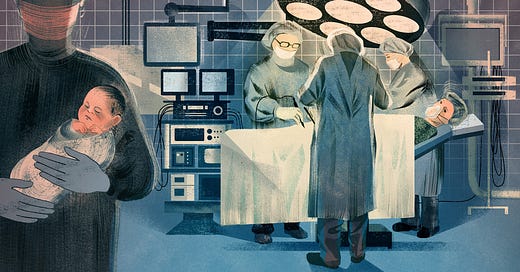I Went to the Hospital to Give Birth…And Tested Positive for Meth
When the nurse first told me, mid-labor, that there were methamphetamines in my system, I cracked up laughing at the absurdity. When child services showed up, it stopped being funny.
It’s the birth of my first child, and I’m seven, maybe eight hours into labor. Whatever time it is, I’m well past the point of caring about modesty, so I don’t even think it’s strange when a nurse follows me into the bathroom.
“Just so you know, you’ve tested positive…” The nurse pauses there, and shifts her eyes to the floor. My anxiety fills the silence. I expect she’s going to say something about the whirring machines that have been measuring the baby’s heartbeat, my contractions, my blood pressure, any of those things.
“For methamphetamine.”
Relief floods me, and I explode with laughter. Meth? I didn’t even take Tylenol during my pregnancy.
“Well, I’ve always been a positive person,” I say, because cracking awful jokes is what I do to pave over uncomfortable situations. I smile, and the nurse seems relieved. Clearly, this is a mistake. I offer to give another sample.
The nurse crosses her arms in front of her chest while I squat over the toilet, one hand hoisting my hospital gown up toward my enormous belly, the other dangling the plastic cup in an area I can’t even see. Remarkably, my aim is true.
If there’s one thing I’ve mastered during pregnancy, it’s peeing into cups. My obstetrician’s office required a urine sample at most every visit to check hormone levels. At this point I’m 42 weeks, so I’ve peed into dozens, maybe scores, of sample cups. That’s probably why I wasn’t even aware the hospital administered a drug test when I checked in to give birth. My everyday routine as a pregnant lady involves peeing on demand.
The nurse sends the sample to the hospital’s lab.
When I imagined labor, I expected to pass the time by stretching on an exercise ball or pacing the hospital’s long white hallways. But my doctor is concerned about the baby’s heartbeat – it drops dramatically every time I have a contraction – and so I am confined to a labor bed, an IV of fluids in my arm, an oxygen mask on my face, and belts stretched across my belly to monitor the baby.
So I make do. My doula rubs lavender essential oil on my temples, and my husband plays “Push It,” the Spotify playlist I created for labor and delivery. I have a photo of Beyoncé propped up on the over-bed table, because if anything can inspire me, it’s Queen Bey. Also on the table is my birth plan, which is kind of like a wish list for delivery. That includes modest requests, like keeping the door to my room closed, as well as more imperative things, like, “Please delay all routine procedures on the baby until after the bonding and breastfeeding period.”
Occasionally I convince the staff to unhook the machines and let me move around the room for a few minutes. It’s better that way. Movement helps distract from the contractions, allowing my body to muscle through each wicked snap. But when I’m in bed, I’m hit with the full force of every punch, my vision blurring and sparkling along the edges. It’s like a migraine, but rippling through the entirety of me, and I just have to lie there and take it.
I’ve just done a few stretches and heaved myself back into bed when another nurse enters the room. I snap the oxygen mask back on my face as she delivers her news.
My drug sample is positive for meth. Again. The nurse ticks off a list of everything that’s about to happen: The baby will be tested for drugs. The hospital social worker will meet with me before I can be discharged. Child Protective Services will be contacted to evaluate my fitness as a parent.
“And of course, you cannot breastfeed the baby,” the nurse finishes.
I rip the oxygen mask away. This isn’t a joke anymore.
Keep reading with a 7-day free trial
Subscribe to Narratively to keep reading this post and get 7 days of free access to the full post archives.




